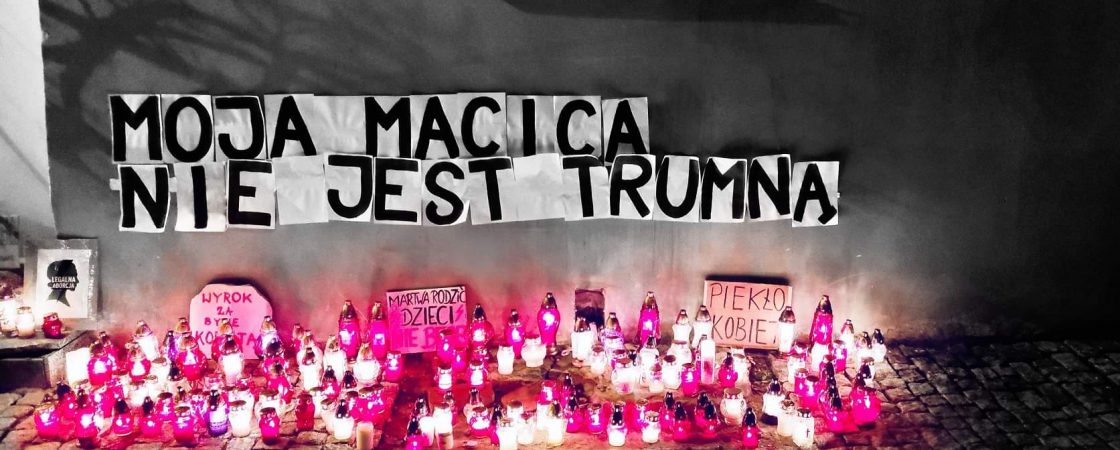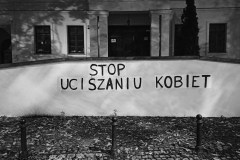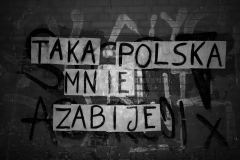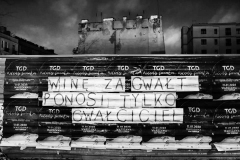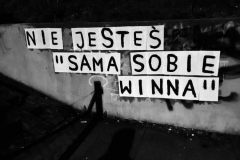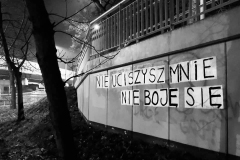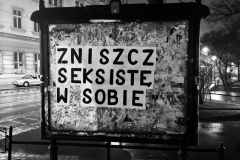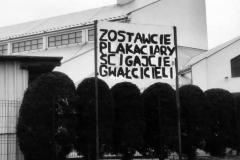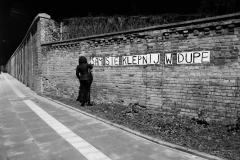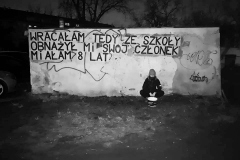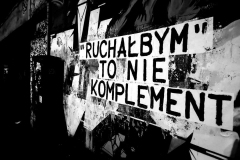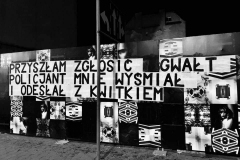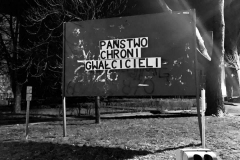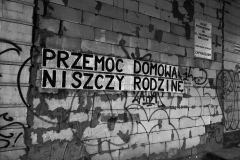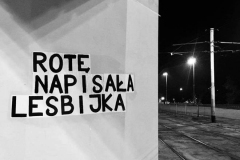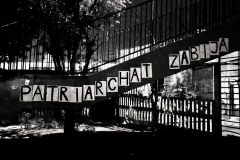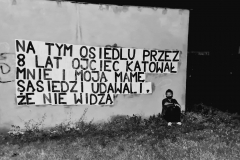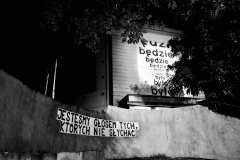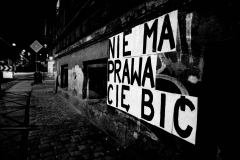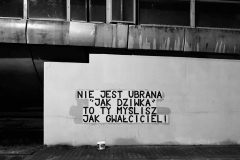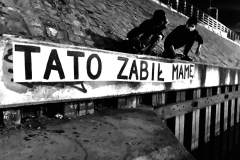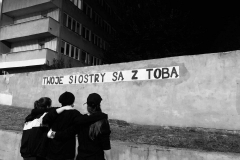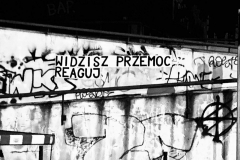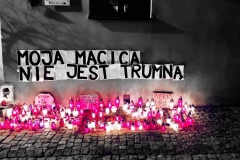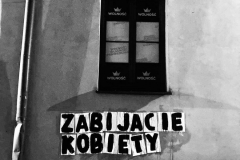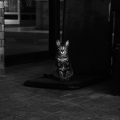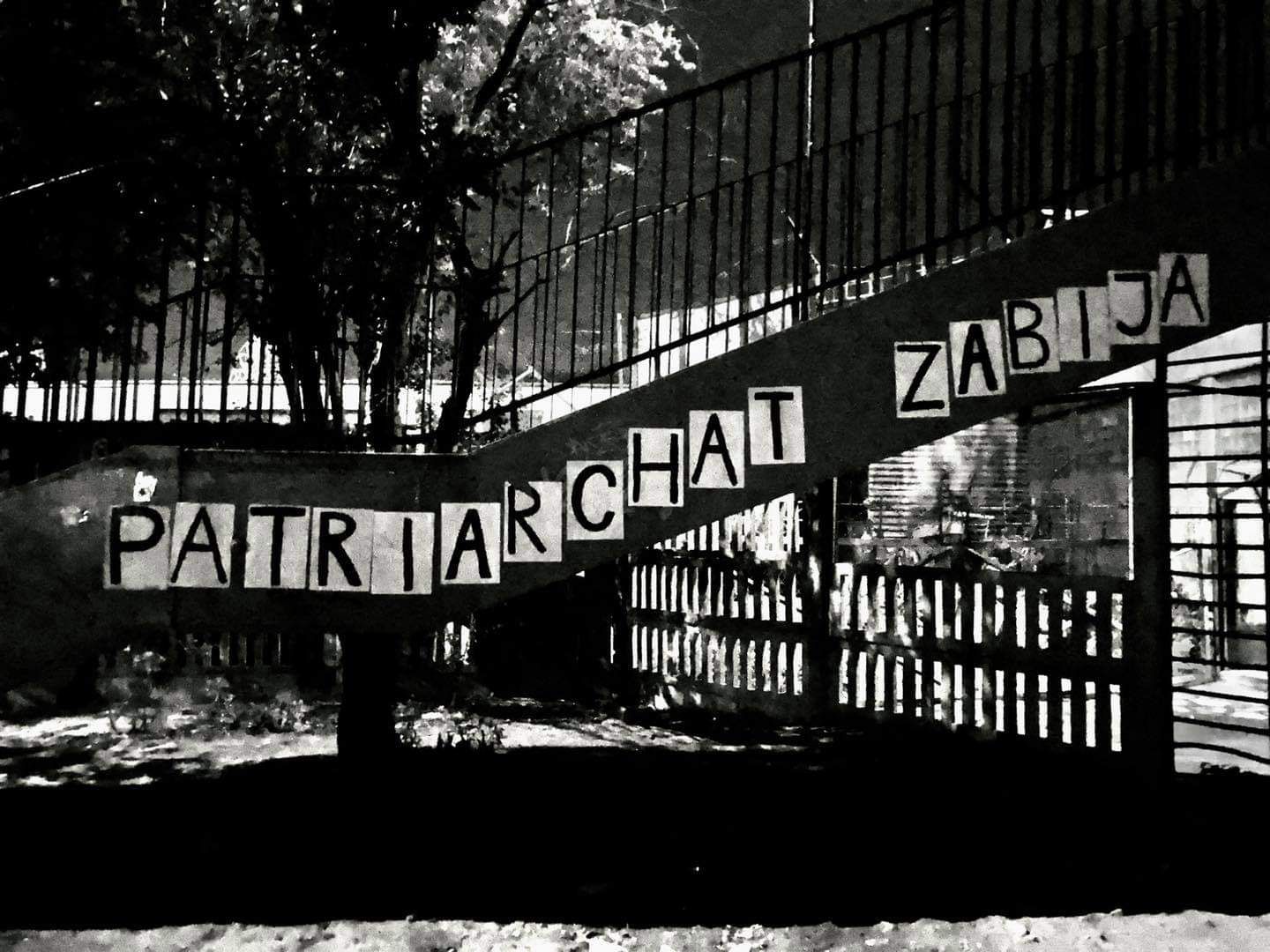
Gluers Against Violence Against Women – a feminist voice of the streets is not nice nor acquiescent
Translation: Michał Toński
The Gluers movement started in France. Marguerite Stern, a former activist of Femen, started to single-handedly post stories of women murdered by their partners, on the walls of Marseille. She was the first to use the distinct bold black letters on white sheets of paper – one letter taking up the whole A4 page. The aesthetics caught on; soon, more women followed in her footsteps. They started to self-organize, the movement spread from France to other countries. The first slogans appeared on Polish walls a year ago. Olga Plesińska talks to Gluers: Janka, Maja and Rozalka.
Olga: How do you perceive the activity of Gluers – is it street art, a grassroots social movement, a performance?
Maja: When I first saw the posters in Wrocław and didn’t know who was behind them, I thought: probably some artists. Those slogans were bold, and I usually observe such brave actions in feminist artistic community. I thought to myself: ‘this is some kind of a freaking great performance!’ Not because of the means but the strength of the posted slogans. In practise, from the inside, I see that making those posters does not involve much care for the artistic aspect. The artistry shows only after the poster is put up and perceived from the outside. Not entirely consciously, we create great, involved street art!
Janka: From the definition: art is an act, or an artifact made with an artistic or communicational intent. Art produces emotional reaction of the audience and provokes thought. It expresses ideas, emotions, a point of view, it can draw attention to a problem – in such cases, we talk about involved art. If you look at the activity of Gluers this way, it looks like we are street artists.
Rozalka: I, on the other hand, think of the postering as a grassroots social campaign. It’s an educational activity in public space; we increase the awareness of the violence against women issue.
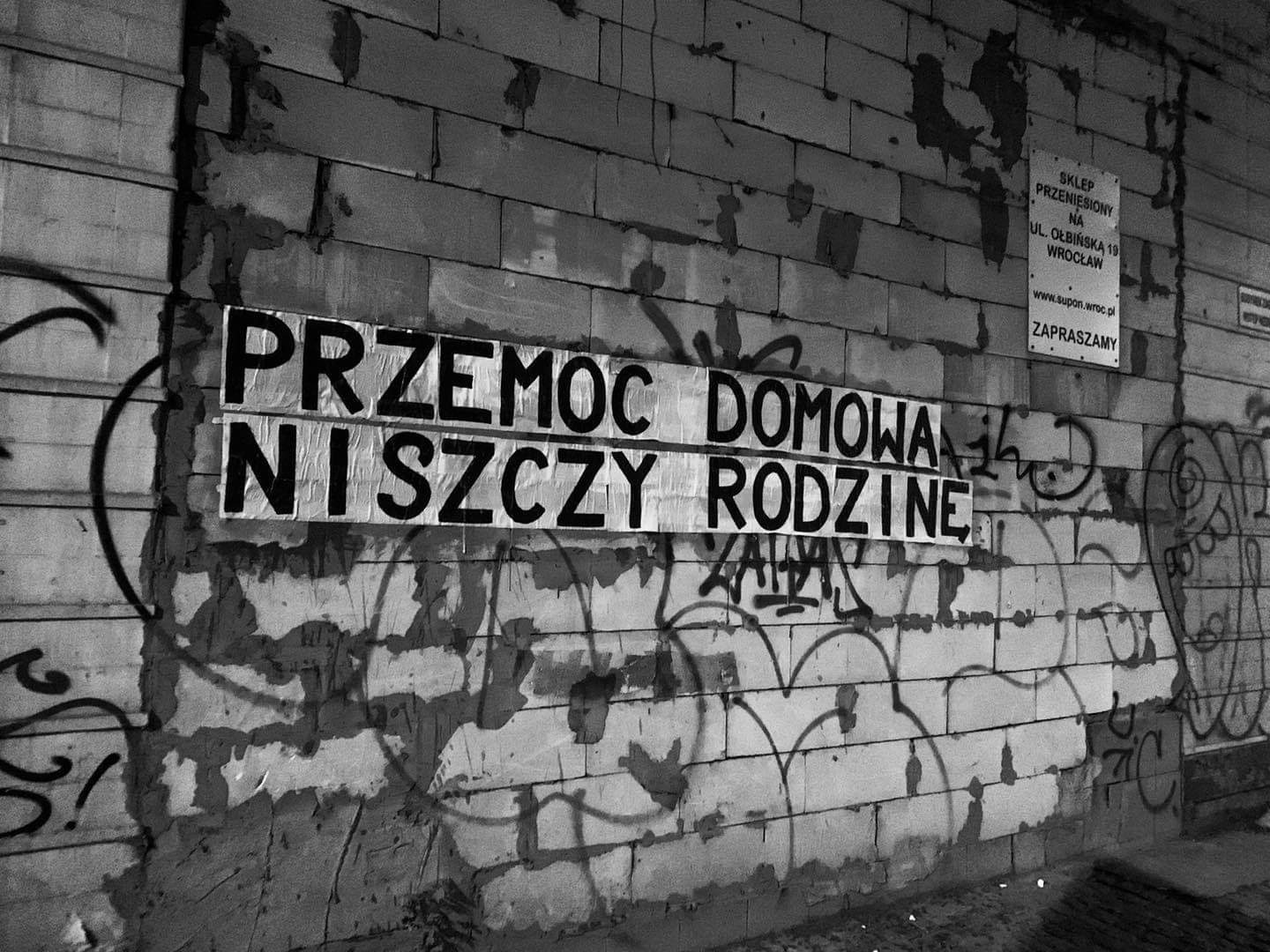
Olga: Can you think of any specific slogans that got to you the most? For me, the most touching was the one posted near that girl’s house. The author tells the story of violence she’s been suffering from her own father for years and points out that her neighbours did not react. There she is in the picture on your website, sitting by this poster. I feel her courage, I get the chills.
Rozalka: The slogans that are in any way personal get to me the most, as well, they are the most powerful, the most real. In the case of the slogans I posted, the most powerful to me is the one saying: ‘My womb is not a coffin’. It’s very accurate in the current situation in Poland. I am mortified by a vision of becoming a mother, mainly because I wouldn’t be ready to give birth to a child with a congenital defect, or a child that dies shortly after birth. I doubt that any one of us is ever really ready for this, physically or mentally. You can declare a lot but the perspective changes when it actually happens to you. In any case, raising even a healthy child in a country so full of hatred seems more than I could handle.
Olga: Where did you paste this slogan?
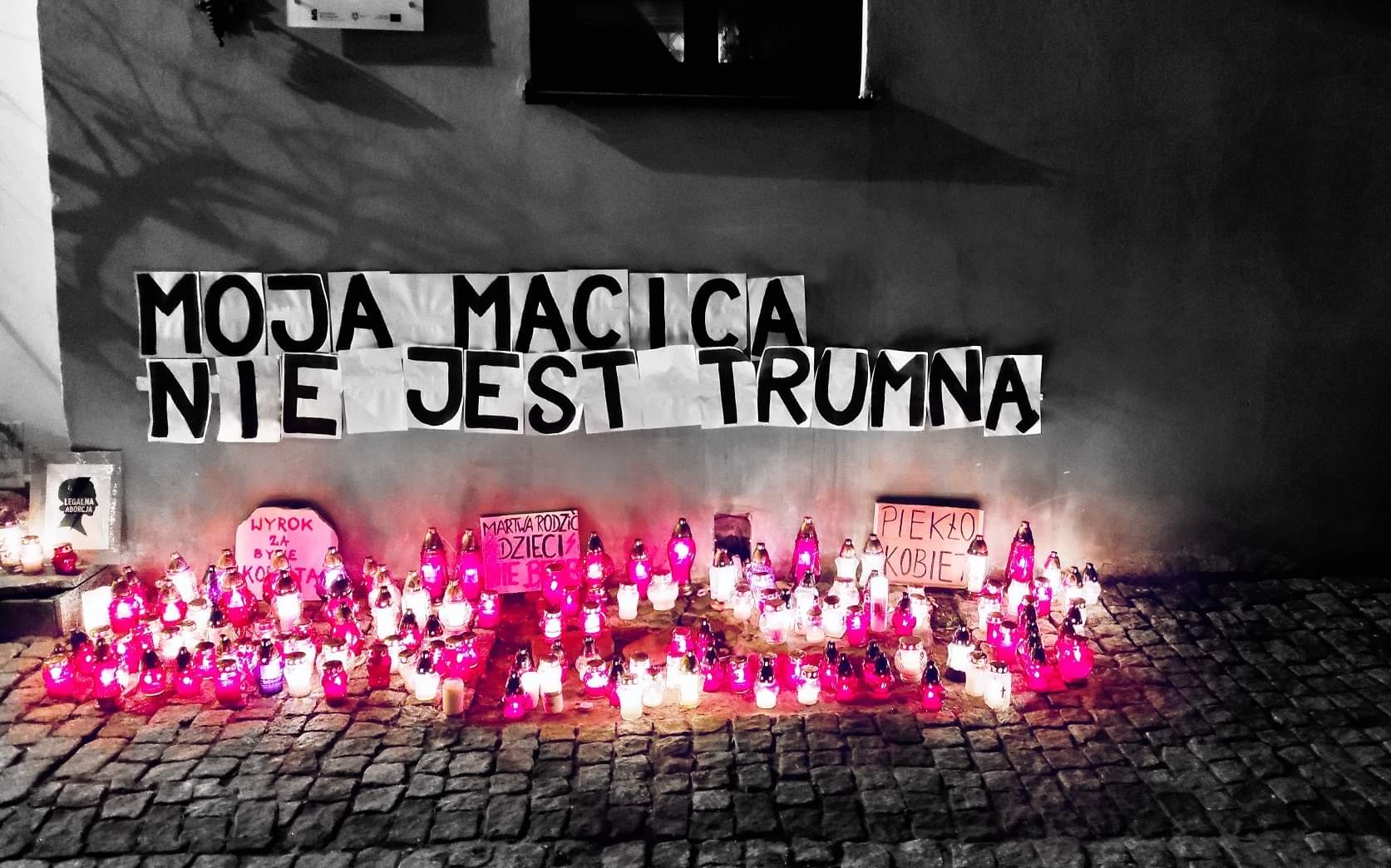
Rozalka: It was on a wall of the [Polish far-right] ‘Confederation’ party office, in my hometown. They voted for the total abortion ban, they were working for it, we wanted to scream at them: ‘Hey, misters, I do not accept it, I won’t be a coffin!’. The poster quickly disappeared, but a couple of days later there was another one under their window: ‘You kill women’. We pasted them, because we cannot let them decide between themselves that we’d have to baptise deformed children so they could die in Christ’s name. To me, it is utter nonsense, it is women torture.
Maja: I identify the most with a quite vague slogan: ‘A Poland like this will kill me’. This one is very accurate for many people and many situations: forcing women to give birth, not supporting them during pregnancy nor providing prenatal care, LGBT+ kids committing suicide, a wide spread of domestic violence, rape… I also like the ‘Stop silencing women’ slogan – I suppose it’s really rebellious, people keep on taking those posters down but we put them up again. The whole world is programmed to silence us, and give voice only to white heterosexual men. We do not accept that.
Janka: I pasted my story on my old way from elementary school, where a man exposed himself to me once. I was 8 years old. Postering is not only directed at people who experienced violence, like ‘You are not alone’. Some of the slogans are aimed at the aggressors: ‘Stop raping us’, ‘Grab your own ass’; there are educational ones as well: ‘1 in 5 women have experienced rape’. Others may be first-hand accounts of a situation, like mine or the one you mentioned.

Olga: What are your feelings in regard to the latest protest [in Poland]? Do you participate?
Rozalka: I go to every demonstration in my town, and I also participate in activities one could call ‘strike guerilla’. I am pissed off by this whole situation, to put it mildly. We are in the 21st century, and what can I do in this country, as a woman? Nothing. The situation is tragic, Poland is regressing, hell for leather. I dream that finally something goes down and they all realise what rubbish they have been saying and apologise…
Maja: The emotion that is with me all the time is anger. For the fact that I must suddenly reorganise my everyday life to be able to go to a demonstration, too. I cannot believe I have to fight for such basic rights. You would be suspecting it’s a standard, something that should be guaranteed as an absolute law. Lately, the police officers dragged me up from the crowd and I got a fine. I didn’t accept it, and next thing I know, I hear a whole bunch of strange charges from the police. This scared me a bit so I’ve temporarily skipped going to the protests, I wouldn’t like to bury myself in some unforeseeable legal consequences. I’m mad at myself for not being there, I wish I could participate in the protests and fight on. It is hard when you have to take care of yourself sometime and follow your common sense. It angers me that such situations, when I have to face those dilemmas, ever occur.
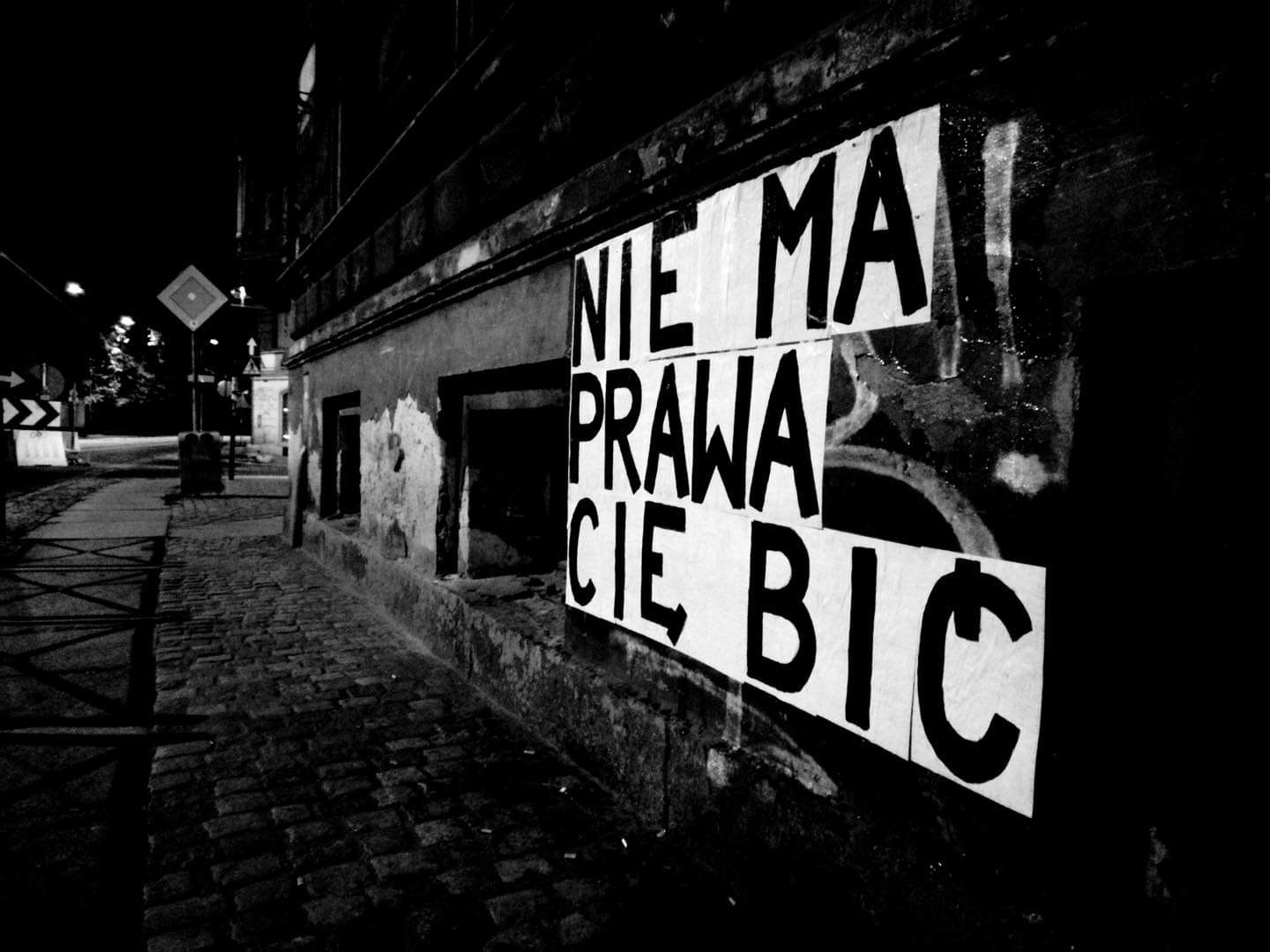
Olga: My life comes down to protesting right now, I adjust all other things to it because I feel responsible, an imperative of solidarity. I wonder if you feel the same when you go to the streets with posters and brushes. Are you afraid that the police stop you?
Rozalka: I have to do it, no one will do it for me. I am a woman and I stand for myself and other women. I never thought about postering in terms of breaking the law. The fact that I go out to paste the posters, makes me not feel passive.
Olga: Are you afraid?
Rozalka: Quite the opposite! Contrary to what you may think, postering is a stress reliever for me. This is my fight, I do it because I must, but in a way, I feel comfortable in it. You know, one time the police approached us, we got a fine each… And so, what? The next day I was out posting in the same spots. Nothing is more important now than every one of us feeling free, safe, and comfortable in their environment. Yesterday the police approached us as well, an officer asked me what I was doing. So, I told him to read the slogan. We are fighting here – not devastating! Nowadays, you can be stopped by the police under any pretence. You can be going shopping with a rainbow bag and have your details taken by the police.
Olga: What happened next? What did the police do?
Rozalka: In that very situation we had the owner of the building’s consent, it was a wall of the most known gallery in Lublin. The owner was with us, helping to hold the ladder, so the police had to leave because they had nothing more to do there.
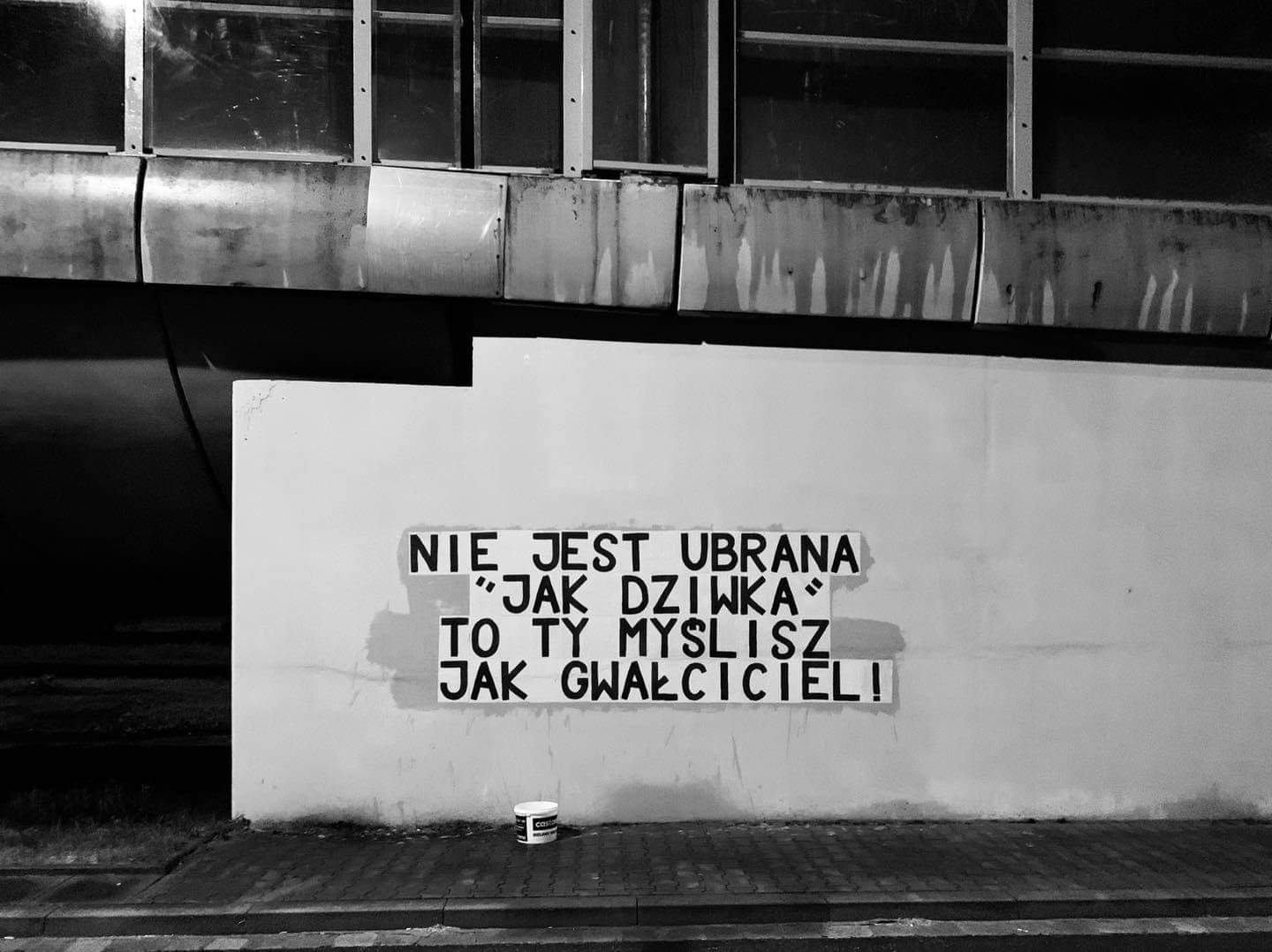
Maja: I feel many different emotions during pasting. The preparation alone is important. Sometimes we paint the slogans by hand, sometimes we print them, both ways require time. Those preparations have therapeutic power, they give me a sense of agency. The thing I want to say, I say in printed capital letters, and I’m about to go and post it somewhere in town! It is very empowering, I feel heard. In another aspect – a person experiencing gender related violence can be passing by my poster. Maybe when they see it, it can be empowering to them as well.
Olga: Have you ever encountered a situation like the one Rozalka just talked about?
Maja: No. On the contrary, a couple of times I heard people passing me by, saying: ‘Oh, Gluers! Doing a damn good job!’. We are recognizable, and it’s nice. It gives us a lot of hope and strength. I believe that, especially now when our agency is taken away from us by an act of law, we need to find it elsewhere, reclaim in another form.
Olga: I heard accusations that what you are doing is vandalism. What’s your stance on that?
Rozalka: Vandalism is a group of minors drawing penises on the walls, or hooligans writing slurs about another sports club. We are securing space for ourselves; we tell the stories of our experiences. We go home but that thing stays there, it’s being seen. What else must we do for our voice to be heard?
Janka: Considering how many rapists, bullies and paedophiles roam the streets freely, pasting a bunch of paper sheets with glue on raggedy walls is nothing. It’s making my blood boil when I hear women’s stories more fit for a horror movie, and learn that the police sent them away with nothing, when they were seeking justice for themselves. And at the same time Rozalka is regarded as a vandal and gets fined!
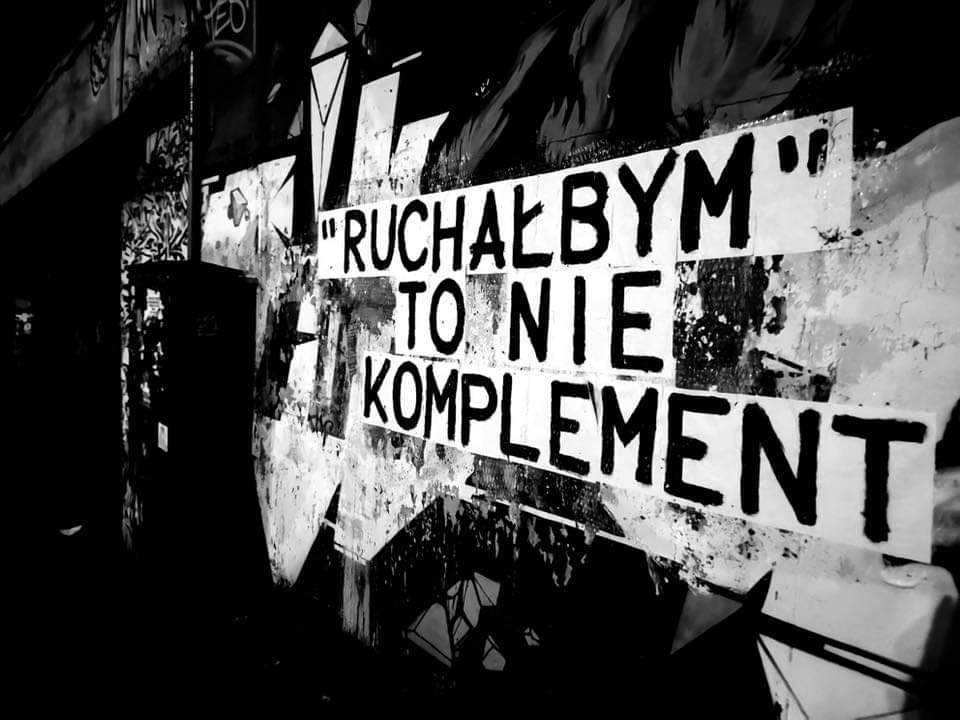
Olga: ‘Reclaiming space’ is a phrase that gains popularity in some circles, you talk about claiming it, why? What do you mean by that?
Maja: I speak of claiming because it is not reclaiming space, it’s creating it from scratch. We often don’t see it, it’s transparent to us because we were being raised in a world of patriarchy. Only when I started taking interest in it, educating myself a bit, did I realise that there is actually no space for true stories of women. That is why I create everywhere I can. Public space, walls, buildings are a great platform for stirring up a discussion, raising an issue. The aggression and frustration of ‘patriarchy militants’ are a good indicator of how powerful the standpoints we post are.
Olga: Are you annoyed when somebody tears down your poster?
Maja: Sure, it’s painful and aggravating. But at the same time, shows how society reacts when a woman enters the spotlight and tells what is important to her. She claims the space to tell her story. People are still offended by the fact that someone points out the problem of violence. Gluers’ activity is building islands on which there is a space for a woman’s voice.
Olga: The term ‘patriarchy’ comes up a lot in our conversation. What is patriarchy in public space in your understanding?
Maja: To me, the patriarchy in public space is a patriarchy in our heads. Everything is male by default. It involves the depiction of women in pop culture, we can see it in everyday situations where male gender is the default. Pointing it out is unwelcome.
Janka: By postering we simply claim the space that we deserve. Since childhood we are conditioned to being background characters for men and thinking our needs are less important. The best example of this in public space is the ratio of male to female toilets. There are more male facilities – urinals and stalls. While from a physiological and cultural point of view (periods, lactation, more frequent urination, taking care of children, elders and people with disabilities), it’s women who need to use the toilet a lot more frequently and spend there more time than men. And so, we wait in those never-ending queues, being forced to hold in one of the most basic physiological needs. It’s humiliating.
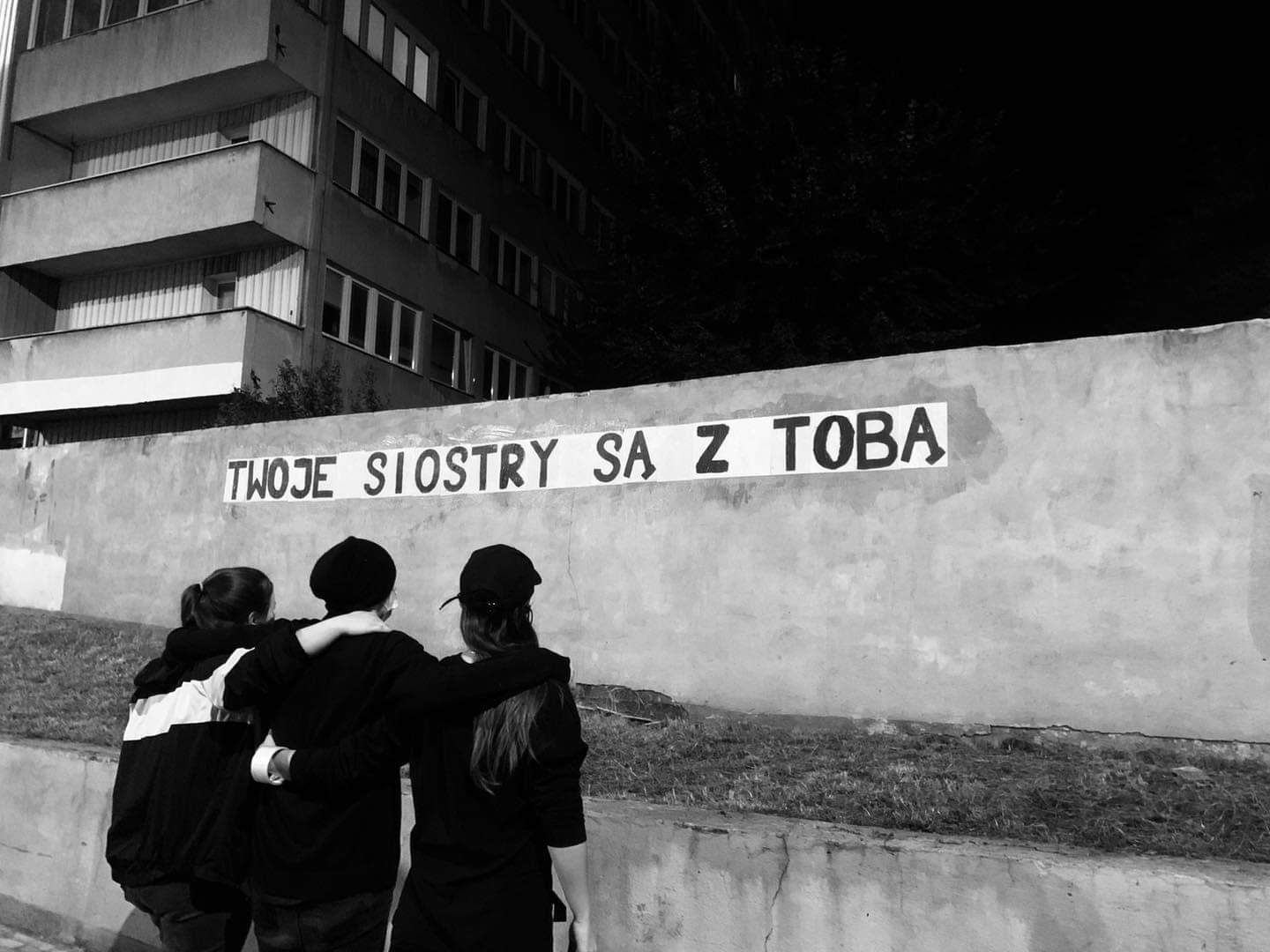
Olga: Why are the accounts of violence and discrimination predominantly shown in the public space? One could think it’s playing the victim…
Rozalka: So, what, should we rather say that a woman was on the moon or invented something? People would see it, think to themselves ‘whatever’ and move on. It won’t change our situation in any way. We show the truth because the reality is hypocritical, everybody lies: the media, politicians, advertising companies. We need to start with this, so the issue becomes visible.
Maja: That’s right, women can be scientists, engineers, doctors, professional drivers. Even as we speak, it’s getting through to the pop culture, we get a certain visibility. What does not have a representation in public debate, is women experiencing violence daily. No one hears their voice. We are not in the mood to celebrate anything, sell an image of a smiling, successful women. Now is the time to create space for what is tough and requires change. ‘What is private is political’, we are going back to the narration of the second wave of feminism. I believe that this is a good direction for Poland nowadays. We need emancipation of all women, not only those whom patriarchy regards as remarkable. Stories of regular women who have experienced or are experiencing violence must be heard. They need to shape the debate because they are affected by this systemic issue.
Janka: Freedom from violence is a basic right of every person. There are no women who would not suffer from sexism, molesting, sexual or physical violence. This is (sadly!) a universal experience for all of us. First, we need to free ourselves from it to be able to feel accomplished in life. That’s why we think it is the most important, and that’s why we need to talk about it in the first place.
Rozalka: Just take a look at the way we are represented in public space. The women who appear on billboards are beautiful, smiling. Perfect. They are presented as adornments. We are not presented as those who are capable, the important stuff is done by men. Have you ever seen an advert in which a woman would be a mechanic and not a sexual object, at the same time? We claim for ourselves the ‘nobody’s space’ – empty, rugged walls. This way we can express that we do not approve of such a way of presenting us in the public space. This is an unrealistic, hypocritical world. Our posters stand out. These slogans are bold, they scream that we’ve had enough of a world like this.
